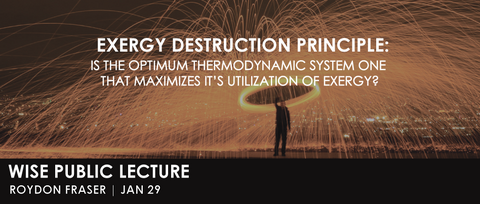Title:
Exergy Destruction Principle: Is the optimum thermodynamic system one that maximizes it's utilization of exergy?
Abstract:
Many proposals have been put forward for a fourth law of thermodynamics (e.g., emergy, constructal theory, maximum entropy principle, maximum power principle, maximum efficiency principle), all relating to the optimization of complex thermodynamic systems. No claim is going to be made that the maximizing exergy utilization (also known as the exergy destruction principle) is a fourth law of thermodynamics, however, it does appear to describe at least one of the major evolutionary principles upon which resilient, efficient, complex thermodynamic systems are built. This talk will use examples from nature to hopefully spark new ideas on how to better design complex, interconnected, energy conversion systems. The exergy destruction principle will also be used to explain why currently proposed 4th laws of thermodynamics are not such. [FYI exergy is a thermodynamic measure of the “quality” of energy, and not its magnitude, form, or direction.]
Bio:
Presented by Roydon Fraser, Teaching Chair & Professor, Mechanical & Mechatronics Engineering, University of Waterloo.
WISE Member Roydon Fraser is the Teaching Chair and a Professor in the Department of Mechanical and Mechatronics Engineering. He is also an investigator in the Green Intelligent Transportation Systems Group at the University of Waterloo.
His research interests focus on energy conversion systems. Primarily, the characterization of spark ignition engine combustion, the integration and control of alternative fuels powertrains into vehicles, and the application of energy and the second law of thermodynamics to the characterization and optimization of complex thermodynamic systems.
Professor Fraser has expertise in turbulent combustion and non-intrusive combustion diagnostics as applied to internal combustion engines, in alternative fuel vehicle development. He places a particular emphasis on natural gas, ethanol and hydrogen (fuel cells) fuels and hybrid vehicles.
